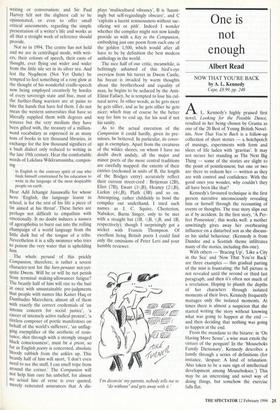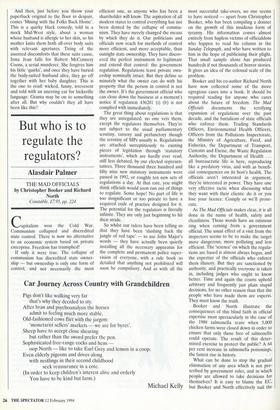One is
not enough
Albert Read
NOW THAT YOU'RE BACK by A. L. Kennedy Cape, f8.99, pp. 248 AL. Kennedy's highly praised first novel, Looking for the Possible Dance, resulted in her being chosen by Granta as one of the 20 Best of Young British Novel- ists. Now That You're Back is a follow-up collection of short stories — a hotchpotch of musings, experiments with form and slices of life laden with `gravitas'. It may not secure her standing as The Next Big Thing — some of the stories are slight to the point of pointlessness; but one or two are there to redeem her — written as they are with control and confidence. With the good ones you wonder, why couldn't they all have been like that?
Kennedy's favoured technique is the first person narrative unconsciously revealing him or herself through the recounting of events or thoughts. The true story slips out as if by accident. In the first story, 'A Per- fect Possession', this works well: a mother unwittingly gives away her overbearing influence on a disturbed son as she discuss- es his sinful behaviour. (Kennedy is from Dundee and a Scottish theme infiltrates many of the stories, including this one).
With others — 'Bracing Up', 'Like a City in the Sea' and 'Now That You're Back' are three examples — this gradual parting of the mist is frustrating: the full picture is not revealed until the second or third last paragraph, and then it's often not much of a revelation. Hoping to plumb the depths of her characters through isolated moments of their lives, Kennedy frequently manages only the isolated moments. At times there is almost a suspicion that she started writing the story without knowing what was going to happen at the end and then deciding that nothing was going to happen at the end.
From the mundane to the bizarre: in 'On Having More Sense', a wise man extols the virtues of the penguin! In the Nouseboks Family Dictionary', Kennedy describes a family through a series of definitions (for instance, 'despair: A kind of relaxation. Also taken to be a sure sign of intellectual
development among Mousebokses.') This may be an interesting and novel way of doing things, but somehow the exercise falls flat.
And then, just before you throw your paperback original to the floor in despair, comes `Mixing with the Folks Back Home'. This is a quirky black comedy, told in a mock Mid-West style, about a woman whose husband is allergic to her skin, so his mother knits them both all-over body suits with relevant apertures. Tiring of the assorted discomforts that these suits cause, Irma Jean falls for Robert McConnery Coons, a serial murderer. She forgives him his little 'quirks', and once they have buried the body-suited husband alive, they go off together with her baby daughter. This is the one to read: wicked, funny, irreverent and told with an unerring ear for hicksville language. Granta may be on to something after all. But why couldn't they all have been like this?



















































 Previous page
Previous page